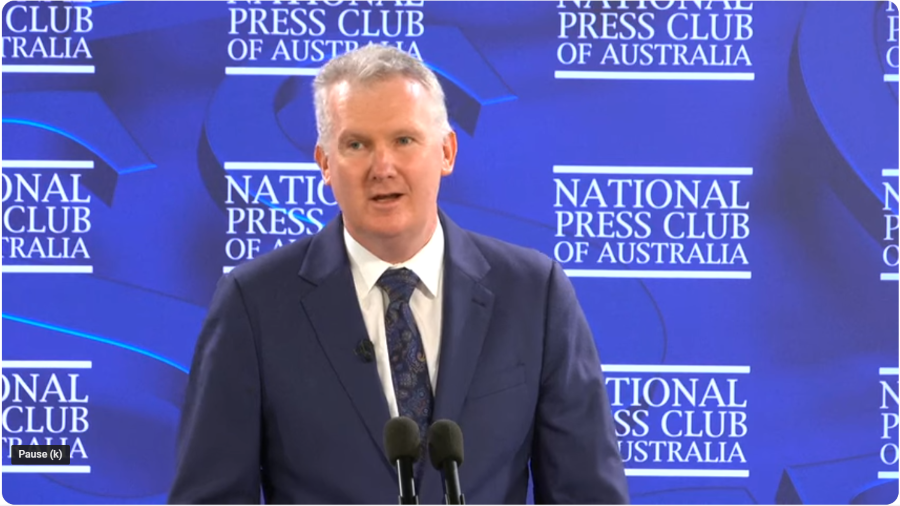
In a speech at the National Press Club in Canberra last week, Industrial Relations Minister Tony Burke announced consultations with leading business groups, including Ai Group, as well as unions to discuss the process for the development of the next tranche of legislative changes relating to workplace relations.
He confirmed this would encompass issues including:
While most of the IR changes will be covered in legislation to be introduced later in the year, the Minister said in his address that some issues would be dealt with earlier.
These include changes to guarantee superannuation as a right under the National Employment Standards.
Compulsory union fees not on agenda
Mr Burke also told guests the Government had no intention of supporting union calls for compulsory fees to cover non-union members.
“Unions are free to argue whatever issues they want for their members . . . but it’s certainly something that is not on our list,” he said.
“There is no Government policy about to happen, or that is happening, that goes down this path.”
Ai Group Chief Executive Innes Willox welcomed Mr Burke effectively ruling out legislation for union bargaining fees.
“This claim was never going to fly, and it was a positive move today for the Minister to make clear that it was not, and we expect that it will not be on the Government’s agenda,” he said.
‘Wage theft’
The Minister said wage theft (as it is described by the government and unions) was a complex area and incentives were needed for businesses to come forward if they had inadvertently underpaid staff.
Mr Burke spoke of three categories of wage theft that needed to be considered when developing legislation.
“The first are the people who inadvertently make a completely honest mistake,” he said.
“The second group are the people where (wage theft) might not have been deliberate, but they were reckless to the extent of really not making an effort to do the proper checks and they had the capacity to do so.
“The third group are people who are absolutely eyes wide open that they are ripping staff off.
“So, what we will be working through is how do you deal with those three different categories? Certainly, for the final group, criminal penalties are clearly applicable. How do you then work through the rest?
“The other thing you want to do is make sure you keep an incentive for businesses to find out themselves and come forward and say: ‘This has gone wrong, and I want to fix it’. You want to keep those incentives in place while also creating enough of a disincentive that people are really strict on making sure that people aren’t being ripped off.
Mr Willox said complex workplace relations laws were largely the cause of inadvertent mistakes by employers.
“This isn't going to be addressed by just further ramping up penalties on employers,” he said.
“There needs to be tangible and urgent steps taken to reduce the complexity of our all too often overly prescriptive and confusing workplace relations laws.
"The Government must also implement measures to support employers who now face a raft of new rules to comply with and will need to grapple with any further changes being considered.
"Industry will be seeking to work with the Government to ensure that any new measures do not inhibit the ability of employers to employ, innovate and invest," Mr Willox said.
Consultation will be better
When questioned about business concern over the manner of consultation preceding the previous round of legislative changes, Mr Burke said it was “reasonable” for industry to want a higher level of consultation this time.
They have requested it and “they’ll get it”, he said.
Consultation with industry also helped the Government to develop policy, the Minister added.
Brent Ferguson, Ai Group’s Head of National Workplace Relations Policy and Legal Practitioner Director with Ai Group Workplace Lawyers, said Ai Group welcomed the opportunity for further consultation.
“Ai Group will continue to be a forthright voice for industry throughout the consultation process,” he said.
“Members are understandably concerned about what a further tranche of regulatory changes will bring. It is crucial that there is strong advocacy for the perspective of employers. The kinds of changes that we expect are being considered could have significant impacts on organisations, the broader economy and our community.
“Having a seat at the table means we will also be well placed to get feedback from members on proposed changes as well as advising them as to how to best navigate any resulting changes.”
Ai Group has already been involved in consultation with the Department of Workplace Relations and Employment. Last year, the Government sought input on the best approach to regulatory change in many of the fields identified by the Minister this week.
To find out more about the benefits of Ai Group membership, please click here.
Welcome opportunity to address problems with IR Bill

Wendy Larter is Communications Manager at the Australian Industry Group. She has more than 20 years’ experience as a reporter, features writer, contributor and sub-editor for newspapers and magazines including The Courier-Mail in Brisbane and Metro, the News of the World, The Times and Elle in the UK.